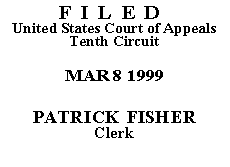

| PHILLIP ARCHULETA,
Plaintiff-Appellant, v. 12TH JUDICIAL DISTRICT, PROBATION DEPARTMENT, STATE OF COLORADO, Defendant-Appellee. |
|
Plaintiff-appellant Phillip Archuleta appeals the district court's summary judgment on his employment discrimination claims in favor of his former employer, the State of Colorado Probation Department for the 12th Judicial District (Probation Department). Because plaintiff has not demonstrated a genuine dispute of material fact and the employer is entitled to judgment as a matter of law, we affirm.
On February 1, 1994, plaintiff was hired by the Probation Department to work as a contract employee with the intensive supervision program and to perform some probation officer duties. On April 1, 1994, upon plaintiff's request, he was transferred to a full-time probation officer position. In June 1994, several incidents occurred: (1) plaintiff filed a motion for a continuance in the state district court which was of such poor quality that the court returned it to the probation office to be redone; (2) plaintiff requested a continuance, alleging he would be out of the jurisdiction on the day of sentencing, but later admitting to the court that he requested the continuance because he had not finished the presentence report; and (3) plaintiff called in sick, but later admitted he was not sick and simply had had "too much weekend." As a result, plaintiff's supervisor gave plaintiff an unsatisfactory performance evaluation, identified five areas requiring improvement, and extended his probationary period. In July 1994, plaintiff missed a filing deadline for a presentence report. After his supervisor was notified, she completed the report herself and asked plaintiff to resign.
Plaintiff brought this employment discrimination action pursuant to 42 U.S.C. § 1981 and Title VII of the Civil Rights Act of 1964, 42 U.S.C. §§ 2000e through 2000e-16, alleging discrimination based on national origin and gender. The district court granted summary judgment in favor of the employer, finding (1) plaintiff's § 1981 claim was barred by the statute of limitations; (2) the evidence was insufficient to make a prima facie showing in support either of his discrimination claims; and (3) even if plaintiff could make a prima facie case regarding his discrimination claims, he could not rebut defendant's showing of a legitimate nondiscriminatory reason for the employment decisions.
On appeal, plaintiff challenges only the grant of summary judgment on his Title VII claims. He argues the district court erred by disregarding evidence of discrimination in the record and by impermissibly weighing the evidence. We review a grant of summary judgment de novo, applying the same legal standards as those used by the district court. See Sundance Assocs., Inc. v. Reno, 139 F.3d 804, 807 (10th Cir. 1998). Summary judgment is appropriate "if the pleadings, depositions, answers to interrogatories, and admissions on file, together with the affidavits, if any, show that there is no genuine issue as to any material fact and that the moving party is entitled to a judgment as a matter of law." Fed. R. Civ. P. 56(c). We examine the factual record and reasonable inferences therefrom in the light most favorable to the party opposing summary judgment. See Sundance, 139 F.3d at 807.
After carefully reviewing the record and the briefs in light of these standards, we conclude the district court correctly found plaintiff's evidence insufficient to raise a triable issue of gender or national origin discrimination. We therefore affirm the summary judgment for the reasons stated in the district court's well-reasoned Memorandum Opinion and Order, dated May 8, 1998.
The judgment of the United States District Court for the District of Colorado is AFFIRMED.
Entered for the Court
Circuit Judge
*. This order and judgment is not binding precedent, except under the doctrines of law of the case, res judicata, and collateral estoppel. The court generally disfavors the citation of orders and judgments; nevertheless, an order and judgment may be cited under the terms and conditions of 10th Cir. R. 36.3.